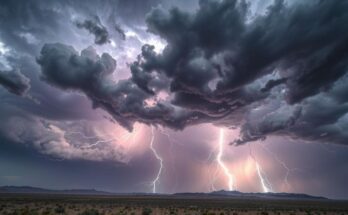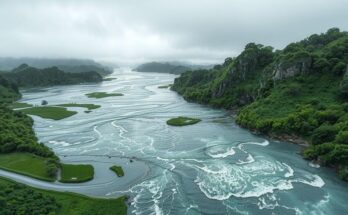Japan is battling its worst wildfire in fifty years, resulting in one death and the evacuation of nearly 4,000 residents in Ofunato. The fire has consumed about 2,600 hectares, significantly impacting local businesses. Climate change, characterized by record low rainfall, has contributed to this crisis, leading to urgent firefighting efforts and community support initiatives.
Tokyo is currently facing Japan’s most severe wildfire in fifty years, leading to the evacuation of nearly 4,000 residents and resulting in one fatality. The blaze erupted in a forested area near Ofunato following record-low rainfall, with white smoke visible in aerial footage. It comes on the heels of Japan’s hottest recorded summer last year, an indication of the impacts of climate change as temperatures continue to rise globally.
As per the fire and disaster management agency, approximately 2,600 hectares (equivalent to 6,400 acres) have been consumed by the wildfire, which is over seven times the size of New York’s Central Park. This marks the largest wildfire in Japan since 1975, when a similar fire scorched 2,700 hectares in Kushiro on Hokkaido Island. Preliminary assessments indicate that at least 80 buildings have sustained damage.
Efforts to extinguish the wildfire include the deployment of military and local fire department helicopters, although the blaze continues to spread. A city official reassured the public, stating, “There is little concern that the fire will reach the city area,” while authorities remain committed to controlling the situation. Approximately 2,000 firefighters are engaged in both aerial and ground operations in Iwate, a region previously affected by a catastrophic tsunami in 2011.
Evacuation advisories have been issued, affecting around 4,600 residents, with 3,939 having evacuated to safety. While there has been a decline in the frequency of wildfires since the peaks of the 1970s, Japan recorded approximately 1,300 individual wildfires in 2023, primarily occurring between February and April, coinciding with drier air and increased wind.
Ofunato recorded only 2.5 millimeters (0.1 inches) of rainfall in February, shattering the previous low for the month. A local weather official noted, “There has been no rain — or very little, if any,” although there are predictions for possible rain or snow soon. The connection between climate change and extreme weather is underscored by the occurrence of heatwaves and heavy rainfall, amongst other weather anomalies.
Several businesses in the region, such as Taiheiyo Cement, have been adversely affected, resulting in plant operations being suspended in the evacuation zones. Furthermore, the confectionery firm Saitoseika expressed that a potential halt in production may occur if their facilities become inaccessible. In a gesture of solidarity, Japanese baseball player Roki Sasaki has donated 10 million yen ($67,000) and bedding to aid those impacted by the fire.
Japan is grappling with its largest wildfire in over fifty years, resulting in significant evacuations and loss of life. The rapid spread of flames amidst record low rainfall and extreme summer heat highlights the ongoing adverse effects of climate change. Despite active firefighting efforts, local businesses and individuals continue to feel the impact as the community unites to support those affected.
Original Source: www.ndtv.com




